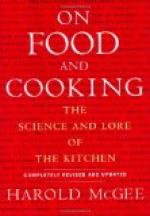Trichinae, tapeworms, and various other parasites which infest the flesh of animals, are so common that there is always more or less liability to disease from these sources among consumers of flesh foods.
Meat is by no means necessary for the proper maintenance of life or vigorous health, as is proved by the fact that at least “four tenths of the human race,” according to Virey, “subsist exclusively upon a vegetable diet, and as many as seven tenths are practically vegetarians.” Some of the finest specimens of physical development and mental vigor are to be found among those who use very little or no animal food. Says St. Pierre, a noted French author, “The people living upon vegetable foods are of all men the handsomest, the most vigorous, the lease exposed to disease and passion; and they are those whose lives last longest.”
The use of large quantities of animal food, however free from disease germs, has a tendency to develop the animal propensities to a greater or less degree, especially in the young, whose characters are unformed. Among animals we find the carnivorous the most vicious and destructive, while those which subsist upon vegetable foods are by nature gentle and tractable. There is little doubt that this law holds good among men as well as animals. If we study the character and lives of those who subsist largely upon animal food, we are apt to find them impatient, passionate, fiery in temper, and in other respects greatly under the dominion of their lower natures.
There are many other objections to the use of this class of foods—so many in fact that we believe the human race would be far healthier, better, and happier if flesh foods were wholly discarded. If, however, they are to be used at all, let them be used sparingly and prepared in the simplest and least harmful manner. Let them be cooked and served in their own juices, not soaked in butter or other oils, or disguised by the free use of pepper, mustard, catsup, and other pungent sauces. Salt also should be used only in the smallest possible quantities, as it hardens the fiber, rendering it more difficult of digestion.
We can conceive of no possible stretch of hygienic laws which admits the use of pork; so we shall give it and its products no consideration in our pages.
Such offal as calves’ brains, sheep’s kidneys, beef livers, and other viscera, is not fit food for any one but a scavenger. The liver and kidneys are depurating organs, and their use as food is not only unwholesome but often exceedingly poisonous.




